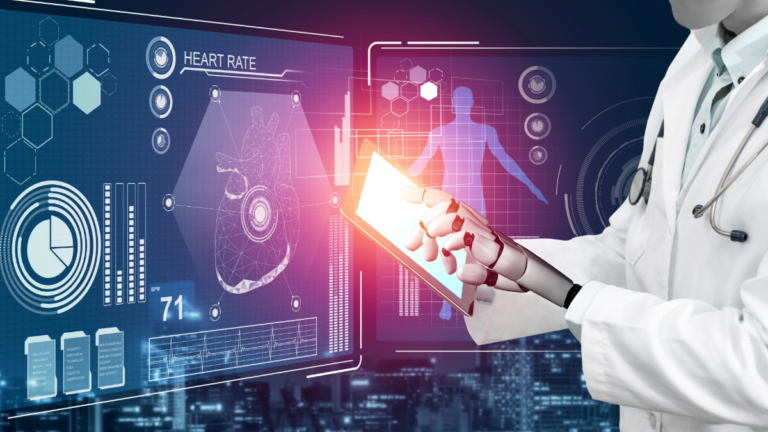Artificial Intelligence (AI) is poised to revolutionise the healthcare industry, offering a plethora of innovative solutions to some of the sector’s most complex challenges. From enhancing diagnostic accuracy to accelerating drug discovery, AI is transforming the way healthcare professionals approach patient care. According to a report by Accenture, the AI health market is expected to grow to $6.6 billion by 2021, with AI applications projected to save the US healthcare economy $150 billion annually by 2026.
Furthermore, it is estimated that AI could improve patient outcomes by 30% to 40% in certain healthcare areas, demonstrating its immense potential to reshape the industry. This article delves into the profound impact of AI on healthcare, exploring its capabilities in diagnostics, drug discovery, and beyond.
The Power of AI in Medical Imaging
In the realm of diagnostics, AI is revolutionising how diseases are detected and managed. Traditional diagnostic methods, while effective, are often time-consuming and prone to human error. AI-powered algorithms, on the other hand, can analyse medical images such as X-rays, MRIs, and CT scans with remarkable speed and precision. These algorithms are trained on vast datasets of medical images, enabling them to identify patterns and anomalies that might be overlooked by even the most experienced radiologists.
Image Analysis: One of the most significant advantages of AI in diagnostics is its ability to analyse medical images at an unparalleled rate. AI can process thousands of images in the time it would take a human to review a handful, allowing for rapid diagnosis and timely treatment. This speed is crucial in conditions where early detection can dramatically improve outcomes, such as in the case of cancer or stroke.
Pattern Recognition: AI algorithms excel at recognising subtle patterns in medical images that may indicate the presence of disease. For instance, AI can detect minute changes in tissue that suggest early-stage cancer or identify markers of cardiovascular conditions that may not be immediately apparent to the human eye. This level of detail can lead to earlier interventions and, ultimately, better patient outcomes.
Improved Accuracy: Numerous studies have shown that AI-assisted diagnosis can significantly improve accuracy and reduce the risk of misdiagnosis. In some cases, AI has been found to perform on par with, or even exceed, the diagnostic accuracy of human experts. For example, a study published in Nature demonstrated that an AI system developed by Google Health could detect breast cancer in mammograms more accurately than radiologists, reducing false positives by 5.7% and false negatives by 9.4%. Such advancements underscore the potential of AI to enhance diagnostic precision and reliability.
Accelerating Drug Discovery: A New Era of Innovation
Beyond diagnostics, AI is also making waves in the field of drug discovery, a traditionally lengthy and costly process. Developing a new drug can take over a decade and cost billions of dollars, with a high risk of failure. AI is changing this paradigm by streamlining various stages of the drug discovery process, from identifying potential drug candidates to optimising drug design.
Identifying Potential Drug Candidates: AI algorithms can sift through vast databases of molecules to identify those with the potential to be effective against specific diseases. By analysing the chemical properties of millions of compounds, AI can pinpoint candidates that may have been overlooked by traditional methods, significantly speeding up the initial stages of drug discovery.
Optimising Drug Design: Once potential candidates are identified, AI can assist in optimising their design. This involves refining the molecular structure of drugs to enhance their efficacy and minimise side effects. AI models can simulate how a drug interacts with its target, allowing researchers to make adjustments before any physical testing takes place, thus saving time and resources.
Predicting Drug Interactions: One of the critical challenges in drug development is predicting how new drugs will interact with existing medications. AI can analyse complex datasets to predict potential interactions, helping to prevent adverse reactions and improve patient safety. This capability is particularly valuable in the context of personalised medicine, where patients may be taking multiple medications concurrently.
Beyond Diagnostics and Drug Discovery: AI’s Expanding Role in Healthcare
While diagnostics and drug discovery are two of the most prominent applications of AI in healthcare, the technology’s influence extends far beyond these areas. AI is playing a pivotal role in the development of personalised medicine, virtual health assistants, and the automation of administrative tasks, all of which contribute to more efficient and patient-centred care.
Personalised Medicine: AI has the potential to tailor treatment plans to individual patients based on their genetic makeup, lifestyle, and other factors. By analysing large volumes of patient data, AI can identify patterns and correlations that inform personalised treatment strategies, leading to more effective interventions and improved patient outcomes.
Virtual Health Assistants: AI-powered virtual health assistants are becoming increasingly common, providing patients with information, answering questions, and even scheduling appointments. These virtual assistants can offer support 24/7, making healthcare more accessible and convenient for patients, particularly those with chronic conditions or mobility issues.
Administrative Tasks: AI is also being used to automate various administrative tasks, such as scheduling, billing, and claims processing. By handling these time-consuming duties, AI frees up healthcare professionals to focus more on patient care, enhancing overall efficiency and reducing operational costs.
The Future of AI in Healthcare
As AI continues to evolve, its applications in healthcare are likely to expand even further. The technology’s ability to improve diagnostic accuracy, accelerate drug discovery, and personalise patient care is just the beginning. In the coming years, we can expect AI to invade more and more areas of healthcare, from remote patient monitoring to robotic surgery and beyond.
While challenges remain, such as data privacy concerns and the need for regulatory frameworks, the potential benefits of AI in healthcare are too significant to ignore. As we stand on the cusp of this technological revolution, one thing is clear: AI is not just an enhancement to healthcare—it is the future of healthcare.

